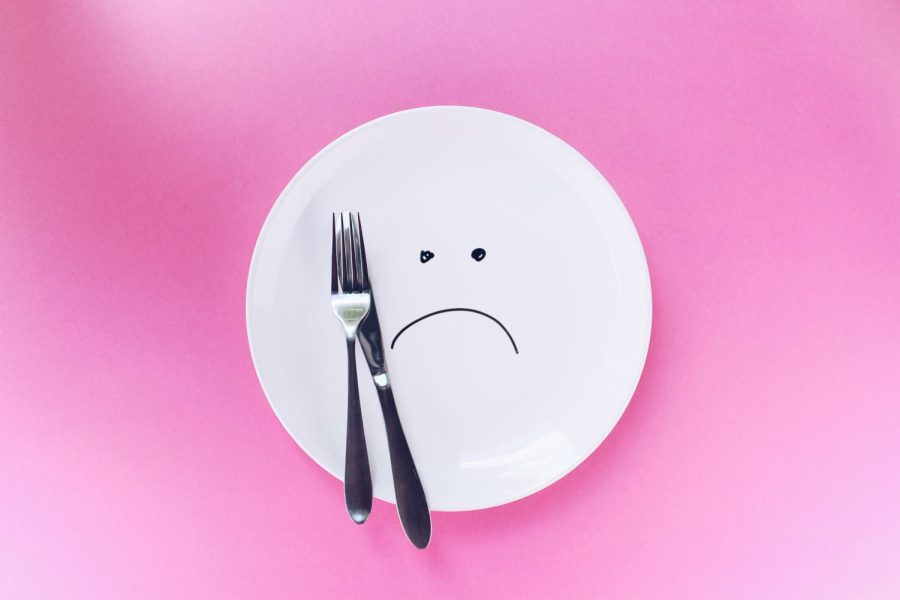Diet Culture: Knowing the Truth
January 3, 2023
Diet culture, the pervasiveness of dieting norms and practices, is everywhere. Not in its 1970’s form of promoting quick weight-loss diets like the Slim Fast or Cookie diet (having a meal-replacement drink or cookie), but under the guise of defining “healthy” for you in black and white terms—and this new attractive form makes us all the more susceptible to it. Diet culture tells us we’re unhealthy when we eat “bad foods” (e.g. a cookie) or eat past 8 pm. We adopt their advice, eager for this sure-fire way to be healthy. While their suggestions no longer sound as restrictive as their previous fad diets, we’d eventually end up in the same place of a dieter—worrying about what we eat. We pass on a party to avoid eating the “bad” slice of cake; after eating past 8 pm, we toss and turn all night, telling ourselves to be healthier the next day.
It’s admirable to want to eat in a way that enhances your experience of life, but we shouldn’t have to fall prey to the messaging of diet culture disguised as health advice. Especially in the age of social media, it is hard to identify credible nutrition advice from an influencer with ulterior motives. The first step to combatting diet culture is educating ourselves about the truth regarding food, so I talked to a Registered Dietician Nutritionist, Jaqueline Zimmerman, to gain her insight on the myths of diet culture.
Terminology
Registered Dietician: a professional who has training and education in food and nutrition.
Nutritionist: anyone who completes a degree in nutrition can refer to themselves as a nutritionist.
Diet Culture: the pervasiveness of dieting norms and practices.
Introduction
Please introduce yourself, including your name, education, and profession.
JZ: [My name is] Jacqueline Zimmerman, MS, RDN, CEDS. For the past 10 years I have been working in the Division of Adolescent Medicine, Cohen Children’s Medical Center. I have a BA in psychology. I worked for several years before returning to graduate school to earn an MS in Nutrition Education at Columbia University, Teachers College, where I also completed the coursework to become a Registered Dietitian Nutritionist (RDN). I am also a Certified Eating Disorder Specialist (CEDS).
What is a registered dietician nutritionist, and what made you want to pursue this field?
JZ: An RDN is a food and nutrition expert. I chose to become an RDN because I was having trouble deciphering all the nutrition advice online; I didn’t know what to believe. I had also started seeing a “nutritionist” to help me with some health issues. I later learned that [many people] can call themselves a “nutritionist,” but not everyone can say they are a Registered Dietitian!
What education does an RD receive in order to be credible in giving nutrition advice?
JZ: There are 3 main steps to becoming an RD/RDN: 1. Complete a minimum of a bachelor’s degree in nutrition (starting in 2024, the minimum will be a master’s degree). 2. Complete 1200 hours of supervised practice through an accredited Dietetic Internship. 3. Pass a national examination. RDNs must also complete continuing education requirements to maintain registration.
How would you define diet culture?
JZ: Diet culture is unfortunately the idea that everyone needs to be watching what they’re eating all the time or doing something special with their eating, which is not true. Diet actually just means what you’re eating. It has come to mean that you [should change] what you’re eating, but in grad school for nutrition, you learn “what type of diet [food] is somebody eating.” It’s supposed to be a neutral term.
The Myths of Diet Culture
The idea of restricting when you eat (intermittent fasting) or not eating past a certain time (like 8 pm) to avoid gaining weight.
JZ: The time that somebody eats does not affect whether they gain or lose weight. Your body will digest your food, and does so in the same way, no matter what time you’re eating.
The encouragement to reduce carbohydrate intake/demonizing carbs.
JZ: There is nothing magical about carbs that makes people gain weight or lose weight. It’s the body’s primary energy source, a source of fuel just like gas has to go into a car. Unfortunately, the diet industry has convinced everyone that carbs are bad. The three macronutrients [carbohydrates, fats, protein] are all equally important.
There are good and bad foods.
JZ: There’s no good or bad food. It’s about your eating pattern in total that affects your health. During certain time periods, like the holidays or on vacation, people will eat differently, but nothing bad happens. So if you’re focused on certain ingredients/certain foods being negative or positive, you’re missing the big picture. Food does not have a moral quality. It’s just food, and our body uses it; it’s up to us to make sure we’re getting a nice balance of foods including things that are enjoyable, like dessert.
There is standard nutrition advice applicable to everyone.
JZ: Everybody is so individual, so nutritional advice [can’t] work for everybody. The nutrition needs for a teenager is going to be very different than that of an older adult. A lot of times, [teenagers] find nutrition advice [on the internet] that’s meant for older people who have different needs or are not as active. Whereas for young people, they are using a lot of energy; their bodies are growing, and their metabolism is at its highest. So nutrition advice has to be different based on your stage in life and what’s going on.
What should teenagers do when they come across people giving nutrition advice online?
JZ: My first day instinct is to say turn it off [or get off social media]. Yes, there are credible people online, but they’re not necessarily giving advice for teenagers. Even if they are a licensed professional, their advice might not be meant for you, and credible sources don’t always give good advice. You want somebody that’s looking at your needs and is going to tailor [their advice] to you specifically.
Advice
Diet culture has transformed itself to consist of enticing messages that define health for you—and everyone else—as being black and white. But as Ms. Zimmerman said, it’s incredibly important to remember that we require individualized nutrition advice because of our differences, whether it’s our age, our job, our medical history, or our physique goals. When someone on the internet suggests eating less carbohydrates, that advice may be meant for an individual who has an insulin sensitivity or is competing as a bodybuilder. As teenagers, undereating carbohydrates would leave us feeling fatigued, struggling to concentrate, and starving for energy.
Of course, if health is subjective to each person, how can we know if we’re healthy? Ms. Zimmerman advises teenagers to “speak with their doctor” (pediatrician). Because diet culture often makes people question how they’re eating, if you ever have a concern, or think something is wrong with your diet, you should speak with your pediatrician. A pediatrician can make sure kids are developing and growing according to appropriate expectations, and pediatricians have the familiarity with a teenager’s medical history to ensure their unique situation is being accounted for when determining if a teenager’s health is on the right track. It’s more than normal to have the goal of eating healthy; just pay attention to where and who you receive nutrition advice from because “you want somebody that’s looking at your needs.”







